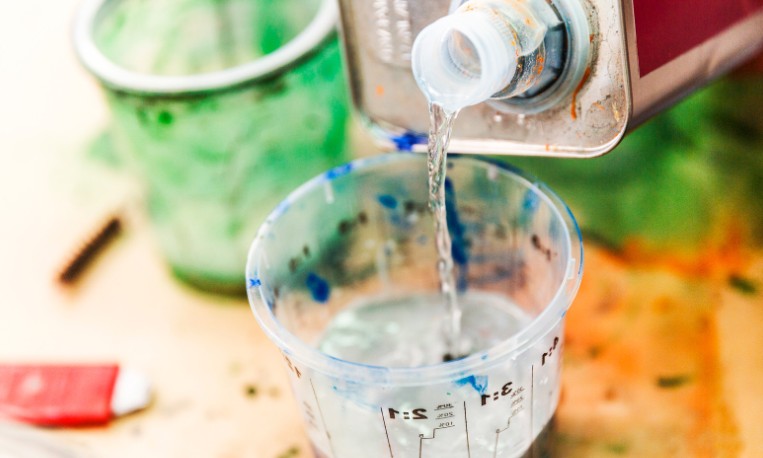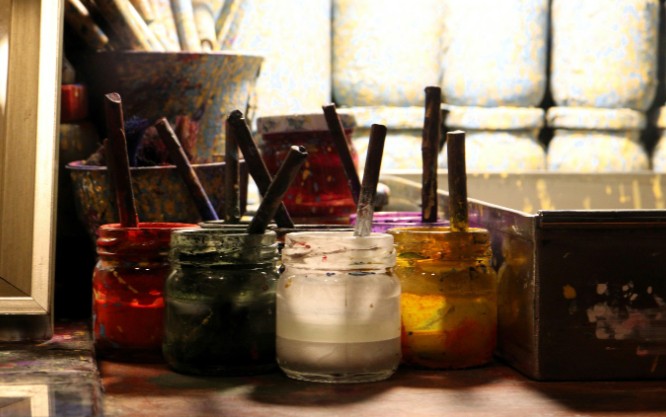- What Is White Spirit and Why Does It Require Special Disposal?
- How to Dispose of White Spirit After Cleaning Paint Brushes?
- White Spirit Disposal: What Is The Right Way in the UK?
- Is It Okay to Put White Spirit Down the Sink?
- Can I Reuse White Spirit After Cleaning Paint Brushes?
- Are There Eco-Friendly Alternatives to White Spirit?
- What Are the Quick Dos and Don’ts When Disposing of White Spirit?
- Summary Table: White Spirit Disposal Methods (Legal vs Illegal)
- Conclusion: What Are My Responsibility as a DIYer?
- Frequently Asked Questions On How to Dispose of White Spirit After Cleaning Paint Brushes
As someone who enjoys the occasional DIY project, especially painting, I’ve often relied on white spirit to clean my brushes after working with oil-based paints.
It’s effective and easily available, but once I’m done with it, I’m always left with a critical question: how to dispose of white spirit after cleaning paint brushes?
It’s a question every UK DIYer should take seriously. White spirit disposal isn’t just about cleaning up properly—it’s about protecting the environment and complying with local waste regulations.
In this guide, I’ll walk you through everything I’ve learned from personal experience, UK government guidelines, and council advice on how to handle this potentially hazardous product responsibly.
What Is White Spirit and Why Does It Require Special Disposal?

Are White Spirits Hazardous?
Yes—white spirits are classified as hazardous substances in the UK. They’re flammable, toxic, and harmful to both human health and the environment.
Because of their chemical makeup, they can contaminate water supplies, pollute soil, and emit harmful vapours if not stored or disposed of properly.
They may seem harmless in small quantities, but improper handling adds up quickly. Just a small amount poured down a drain can cause long-term environmental damage.
How Is the Nature of White Spirit?
White spirit (also known as mineral spirit) is a petroleum-based solvent commonly used in the UK for thinning oil-based paints and cleaning brushes, rollers, and tools.
It has a clear appearance, strong chemical smell, and evaporates quickly, which makes it excellent for cutting through sticky paint residues.
However, its volatile compounds mean it shouldn’t be treated like ordinary liquid waste or household rubbish.
How to Dispose of White Spirit After Cleaning Paint Brushes?
After using white spirit to clean my brushes, I never just throw it away. Here’s the step-by-step method I follow to handle it responsibly:
Step 1: Let It Settle
I pour the used white spirit into a glass jar or metal tin and seal it with a tight-fitting lid. I leave it undisturbed for a few days—usually 5 to 7.
During this time, the paint particles settle to the bottom, and the clearer solvent rises to the top.
Step 2: Decant the Clean Spirit
Once the liquid separates, I carefully pour the clean white spirit into another container to reuse it. This saves money and reduces chemical waste.
Step 3: Dispose of the Sludge
The remaining paint residue (sludge) is hazardous waste and cannot go in the bin. I take it to a local Household Waste Recycling Centre (HWRC) that accepts hazardous materials.
I always check my council’s website for the correct drop-off point and their operating hours.
This three-step process has become part of my DIY routine—it’s simple, safe, and aligns with UK environmental rules.
White Spirit Disposal: What Is The Right Way in the UK?
The UK treats white spirit disposal very seriously. It’s regulated under both domestic hazardous waste laws and environmental protection guidelines.
How To Store Used White Spirit?
I always store my white spirit—used or unused—in its original container or a clearly labelled jar. I write “Hazardous – White Spirit” in bold letters so there’s no confusion. These are my key storage practices:
- Keep it in a cool, well-ventilated place
- Store it away from heat sources and direct sunlight
- Ensure the cap or lid is tightly sealed
- Keep out of reach of children and pets
Correct storage ensures I can transport it safely to a waste centre and reduces the risk of accidental exposure.

How To Take It to a Licensed Waste Centre?
Most UK councils operate HWRCs that accept hazardous household materials like white spirit. I locate mine by searching “hazardous waste recycling [my postcode]” or checking the government’s recycling locator site.
When I visit?
- I keep the container upright and sealed
- I never mix it with other chemicals
- I hand it directly to the site staff, who know how to process it safely
Is It Okay to Put White Spirit Down the Sink?
Absolutely not.
Pouring white spirit down the sink, toilet, or an outside drain is dangerous and illegal in the UK. Here’s why:
- It can pollute rivers and groundwater, threatening ecosystems and drinking water
- It damages your plumbing and corrodes pipes
- It can cause toxic fumes in your home, especially if it evaporates inside closed plumbing
- It’s considered an environmental offence, and you could face penalties
Whenever I’m tempted to take the “easy route,” I remind myself that white spirit disposal isn’t about convenience—it’s about safety and responsibility.
Can I Reuse White Spirit After Cleaning Paint Brushes?
Yes—and it’s encouraged.
By reusing white spirit, I reduce the volume of hazardous waste I generate. Here’s my simple system:
- After cleaning brushes, pour the used spirit into a glass container
- Let it settle for several days
- Carefully pour off the clear top layer into a clean container
- Reuse this for your next cleaning session
- Dispose of the sludge properly
If I ever notice the reused spirit losing its effectiveness, that’s when I know it’s time to replace it completely and take the old liquid to a waste centre.

Are There Eco-Friendly Alternatives to White Spirit?
Yes. In recent years, I’ve tried several eco-friendly and biodegradable paint brush cleaners that are much safer for home use.
These are ideal for water-based and low-VOC paints, though not always as powerful as white spirit for oil-based products.
Here’s a quick comparison of what I’ve used:
| Product | Eco Rating | Effectiveness | Scent | Best For |
| Eco Solutions Brush Cleaner | ★★★★★ | ★★★★☆ | Mild citrus | Water-based paints |
| Bio Strip Brush Cleaner | ★★★★☆ | ★★★★☆ | Neutral | Oil & water-based paints |
| Traditional White Spirit | ★☆☆☆☆ | ★★★★★ | Strong chemical | Only oil-based paints |
Whenever possible, I choose greener alternatives—they’re easier to clean up and don’t require hazardous waste disposal.
What Are the Quick Dos and Don’ts When Disposing of White Spirit?
DO:
- Store white spirit in a sealed, clearly labelled container
- Reuse settled solvent when possible
- Take remaining waste to a council-approved hazardous recycling site
- Switch to eco-friendly cleaners when suitable
DON’T:
- Pour it down the sink or drain
- Throw it in with general household rubbish
- Leave containers unlabelled or open
- Burn it or mix with other chemicals
Summary Table: White Spirit Disposal Methods (Legal vs Illegal)
| Method | Is it Legal in the UK? | Safe for Environment? | Recommended? |
| Pouring down the sink | No | No | No |
| Taking to recycling centre | Yes | Yes | Yes |
| Storing in original bottle | Yes | Yes | Yes |
| Burning it | No | No | No |
| Reusing filtered spirit | Yes | Yes (if done safely) | Yes |
Conclusion: What Are My Responsibility as a DIYer?
Handling chemicals like white spirit might seem like a minor part of a painting project—but the truth is, how I dispose of white spirit after cleaning paint brushes matters more than most people realise.
By following proper storage, reusing what I can, and disposing of the rest through approved channels, I’m not only complying with UK law—I’m helping to reduce pollution and keep my home safe.
Every DIYer has a role to play. And now that I know the right way to do it, I’m committed to never cutting corners again.
Related Article: Is Methylated Spirit the Same as White Spirit? – A Complete Guide
Frequently Asked Questions On How to Dispose of White Spirit After Cleaning Paint Brushes
1. Is it okay to put white spirit down the sink?
No—it’s harmful, illegal, and damaging to the environment and your plumbing. Always dispose of it at a hazardous waste site.
2. Are white spirits hazardous?
Yes. They’re flammable, toxic, and can harm people, pets, and the environment if mishandled.
3. Can I throw white spirit in my general rubbish bin?
No. It must be taken to a licensed hazardous waste facility.
4. How long can I store used white spirit?
If sealed and labelled properly, you can store it for years—but keep it away from children, pets, and heat.
5. Can I take leftover white spirit to B&Q or other stores for disposal?
No. Retailers don’t accept hazardous waste. Use your local council’s HWRC.



0 Comments